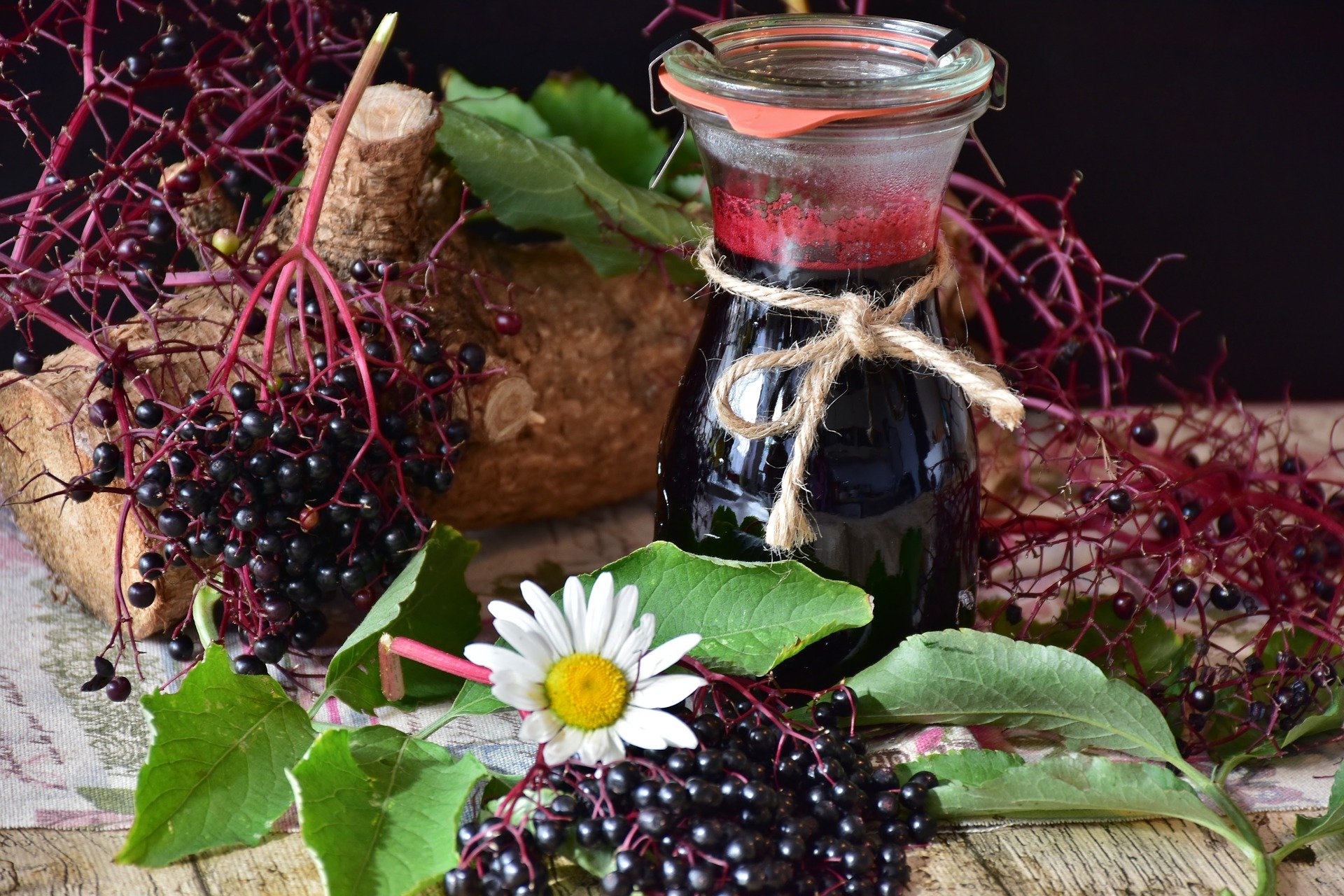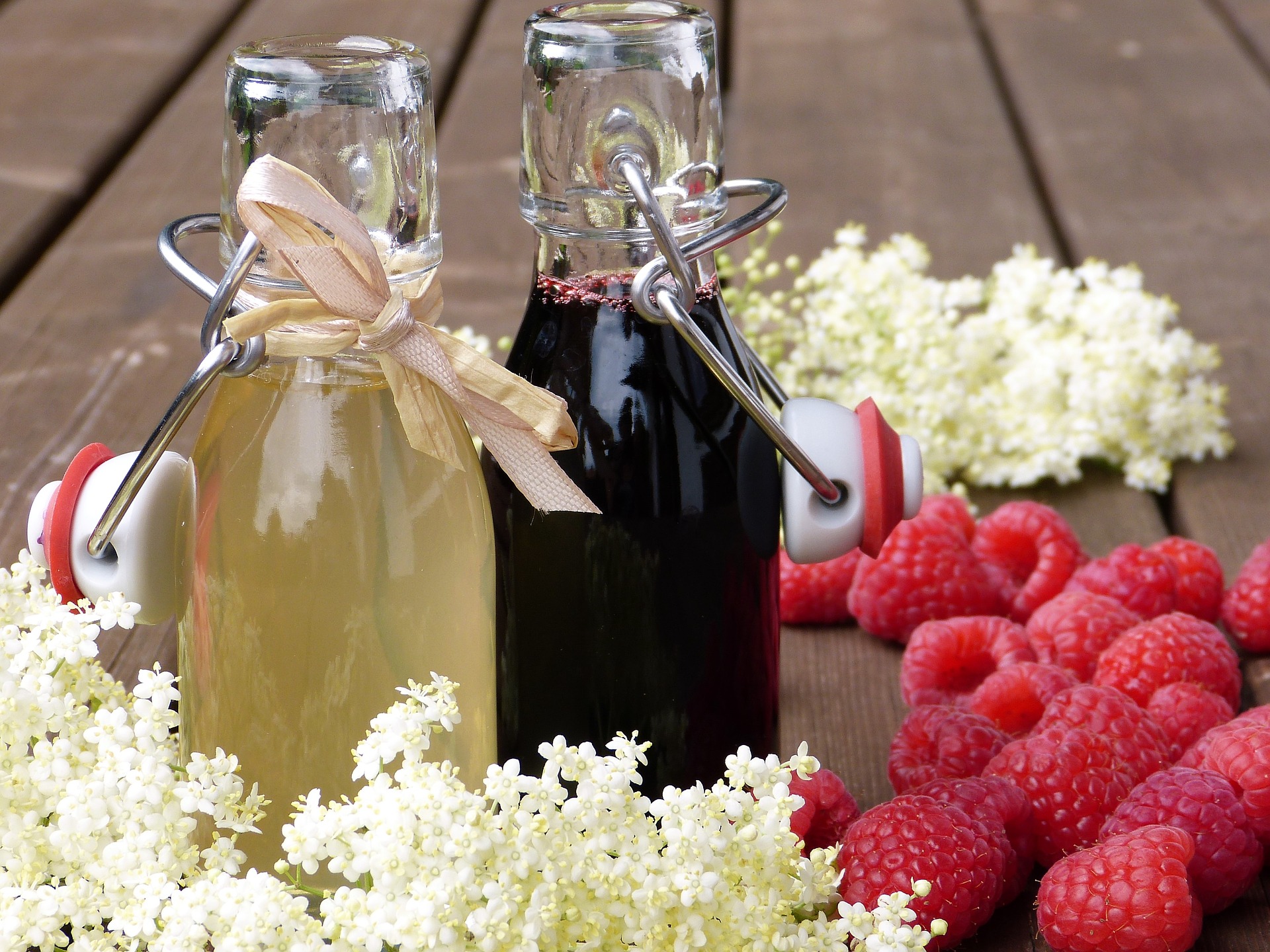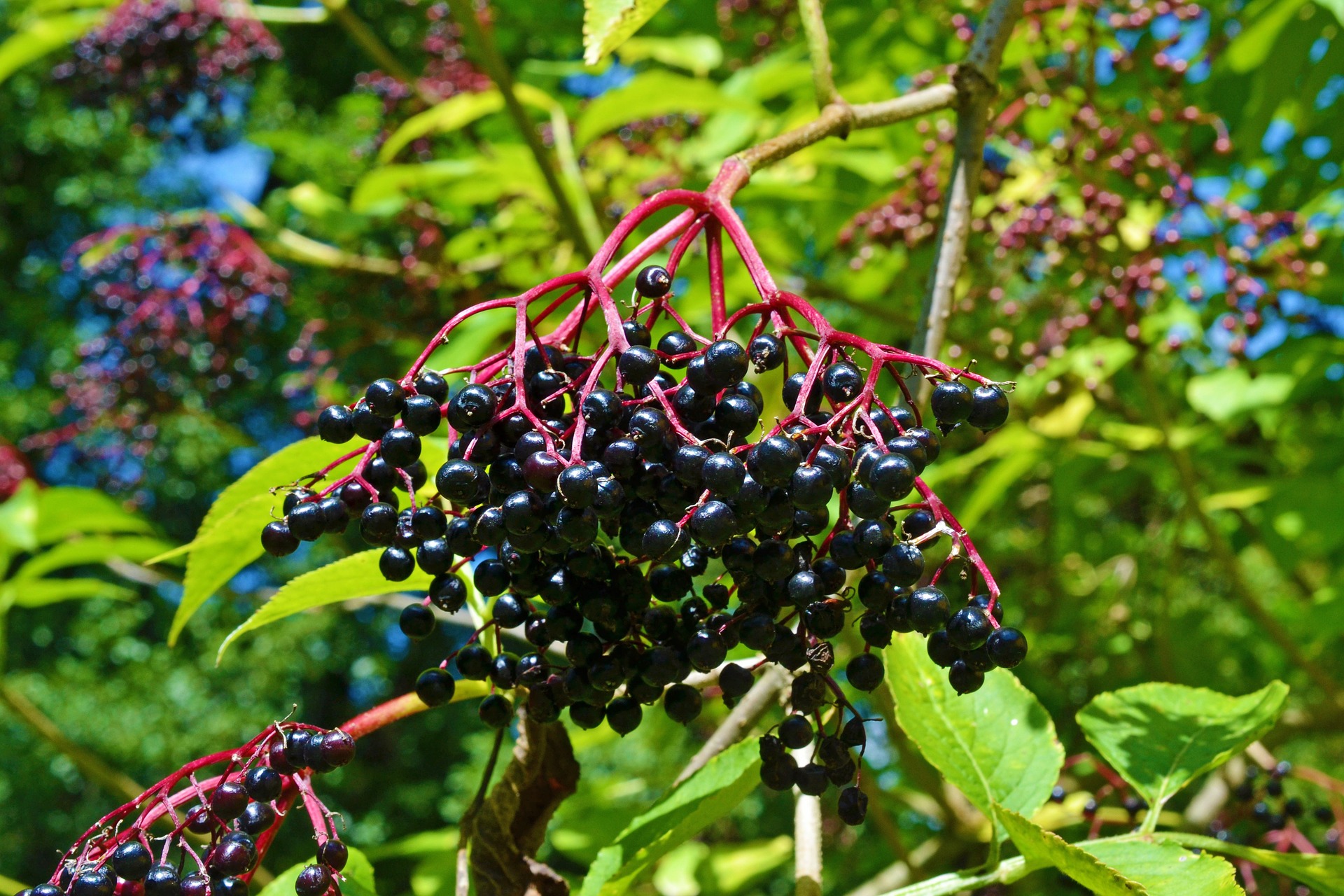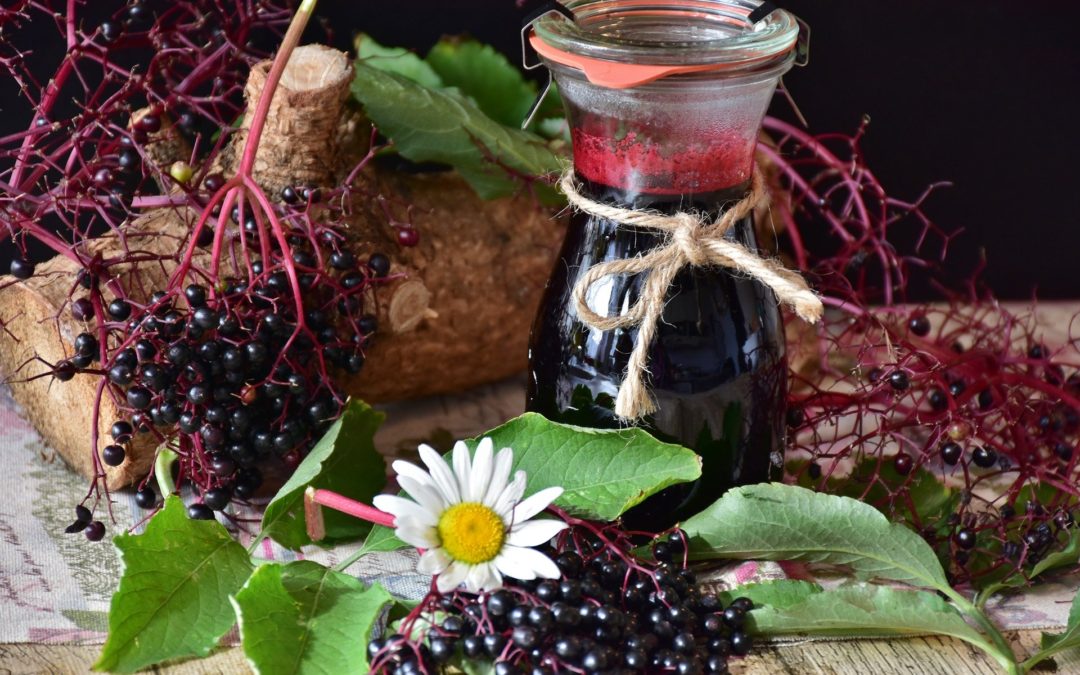Wild Elderberry and its Benefits
In their natural state, elderberries are dark purple, (almost black), looking berries that come from the European Elder tree, (sambucus nigra). Wild Elderberry or sambucus canadensis, is a flowering plant whose flowers are cream or off-white in color. If left alone, Wild Elderberry can grow to heights of 8 – 10 feet. Both types of Elderberry plant can be found throughout Europe as well as in North America.
Elderberries are extremely high in antioxidants and anthocyanins. The fruit is thought to be useful in fighting off the common cold, constipation, the flu, and even sinus infections. Some people also believe that it may be useful in treating toothaches, sciatic nerve issues, and burns, but these claims aren’t backed up by any published studies that we’ve found.
Does elderberry help the immune system?
Based on our analysis of peer-reviewed, medical journal published studies, the short answer is yes, although not that many human studies have been done on the topic. The few studies that have been done to determine how elderberry activates the immune system, indicate that the anthocyanins in elderberry are associated with greatly increased immune system
 coordination. One study showed that elderberry immune support boosts the production of immune cytokines. Cytokines act as messengers within the immune system and help to regulate the immune response which experts believe has the positive anti-inflammatory effect of reduced swelling and pain in certain cases. To clarify, Uncle Sam’s hideously ugly step-nephew, the FDA (or as we privately refer to them, big pharma’s mouthpiece), prohibits us from claiming that Elderberries have any particular health benefit. That said, people “suspect” that it “may” have anti diabetes properties, support cardiovascular health, and have anti cancer properties, in addition to its “possible” anti inflammatory indications.
coordination. One study showed that elderberry immune support boosts the production of immune cytokines. Cytokines act as messengers within the immune system and help to regulate the immune response which experts believe has the positive anti-inflammatory effect of reduced swelling and pain in certain cases. To clarify, Uncle Sam’s hideously ugly step-nephew, the FDA (or as we privately refer to them, big pharma’s mouthpiece), prohibits us from claiming that Elderberries have any particular health benefit. That said, people “suspect” that it “may” have anti diabetes properties, support cardiovascular health, and have anti cancer properties, in addition to its “possible” anti inflammatory indications.
Ripe elderberry fruit is considered safe if consumed in moderation provided that it’s cooked first. The overconsumption of elderberries may cause diarrhea, stomach ache, and abdominal cramping due to their laxative effects. If elderberry is used for medicine, only ripe or dried berries should be used. Parts of the elderberry plant (leaves, stems, roots, and bark) contain a poison known as cyanogenic glycoside. Unripened elderberries contain trace amounts of this poison as well. Elderberries must be cooked before consuming, because the raw berries can make people extremely ill.
With the promise of some extremely beneficial effects and the emergence of CoVID-19 it’s no surprise that Elderberry is all the rage lately, but with all of these differing elderberry products on the market, what should you try, what should you buy, and what should you expect? Perhaps you’ve considered just buying some elderberries and turning your stovetop into your own little elderberry jam production plant. Whatever you’re planning on buying or trying, here is a short list of ideas highlighting our personal favorites when it comes to all things elderberry.
Elderberry Syrup
Elderberry syrup is believed to reduce the severity and duration of the flu and colds if taken within 48 hours of the first symptoms. Evidence from some medical studies does support this claim. A 2019 study on elderberry syrup for both cold and flu concluded that the syrup substantially reduced breathing difficulties and upper-airway symptoms. Scientists believe that a large portion of elderberry’s health benefits are the result of anthocyanin. Anthocyanin, (an antioxidant), works by clearing the body of free radicals that damage the DNA inside of our cells. It also has antiviral effects that may reduce the severity of some infections. Anthocyanins are known to reduce inflammation. Those in elderberry do so by inhibiting the production of nitric oxide by the body’s immune cells which is a signaling molecule that triggers inflammation in response to illness or injury.
 With dozens of Elderberry Syrup options out there it’s difficult to know which products are made by reputable manufacturers and nearly impossible to be certain that you’ll gain the desired rewards. Instead of endorsing any particular Elderberry Syrup, we encourage you to try and make your own. The recipes are readily available online, and the ingredients will end up costing you less than buying a bottle of a commercial syrup anyway. At the end of the day you end up with a good amount of delicious syrup that’s free from harmful additives.
With dozens of Elderberry Syrup options out there it’s difficult to know which products are made by reputable manufacturers and nearly impossible to be certain that you’ll gain the desired rewards. Instead of endorsing any particular Elderberry Syrup, we encourage you to try and make your own. The recipes are readily available online, and the ingredients will end up costing you less than buying a bottle of a commercial syrup anyway. At the end of the day you end up with a good amount of delicious syrup that’s free from harmful additives.
Out of all of the Elderberry Syrup recipes we’ve tried, and we’ve tried them all, our favorite comes from a fantastic stie called wellnessmama.com. That recipe can be viewed on wellness mama by clicking the link HERE, or you can download that recipe without leaving the site by clicking the button HERE.
Elderberry Tea
In addition to the antioxidants and anthocyanins, if properly steeped, Elderberry Tea much like it’s thicker cousin, Elderberry Syrup, also naturally contains Vitamin A, Vitamin C, folate, potassium, calcium, and iron. Because there’s no standardization of process for manufacturing Elderberry Teas, different brands have different blends of the flower from the Elder Tree, and the elderberries themselves. While we don’t want to dissuade anyone from enjoying Elderberry Tea, you should really think of it in that exact light – enjoyment. The jury is deadlocked on whether or not people reap many health benefits from drinking an Elderberry Tea, but all of the experts do agree that if there are substantial health benefits to be had from Elderberry consumption, the homemade syrup option will likely give you a much higher concentration of the good stuff than a tea will.
Elderberry Tinctures
More and more frequently these days, we see numerous products available in the form of a tincture. Elderberry tinctures are certainly no exception. In today’s market, a tincture is usually an oil based delivery system for pure plant extracts. The word tincture used to always mean something that underwent an ethanol extraction, but other methods have since been developed and the word has turned into an all encompassing term as far as consumer perception is concerned.
The benefits of using tinctures as a method of consumption include incremental dosing, meaning you can easily take a fraction of a dose (as little as one drop of liquid at a time), sublingual absorption, which means the medicines are getting into your system faster than if you were to swallow a pill, potency, and portability. As far as how helpful and effective Elderberry Tinctures are, the general consensus seems to be that Elderberry Tinctures rank right at the top of the list along with Elderberry Syrups.
Elderberry Wine
No article discussing the many forms and uses of elderberry would be complete without the inclusion of elderberry wine. It used to be that when people thought of touring a winery, images of Tuscany or Nappa Valley immediately came to mind. Given the combination of climate and nutrient rich soils, these destinations were the absolute perfect places for starting vineyards that grew the delicious grapes necessary for producing nature’s intoxicating libations.

Over the last 25 years though, a trend emerged where pie eyed entrepreneurs have opened wineries just about anywhere that fruit grows – any type of fruit. Almost overnight, it seemed that commercial wines hit store shelves made from strawberries, plums, watermelons, peaches, blackberries, gooseberries, boysenberries, grapefruits, pears, persimmons, pineapple, and of course, elderberries. Some families have been making these “alternative fruit” based wines for generation after generation using recipes dating back hundreds of years or more, but the majority of Americans have only recently discovered most of these wonderful, backyard brews. If you’re a fan of elderberry’s rich flavor profile, Elderberry Wine is absolutely a necessary addition to your must try list.
Like most elderberry concoctions, Elderberry Wine is easily made at home with nothing more than a few simple ingredients, a little bit of know-how, and some patience. The internet is riddled with recipes and easy to follow instructions that don’t require hours and hours of hard work and won’t break the bank. In addition to enjoying the process of making your own Elderberry Wine, and the rich flavorful finished product, you’ll also have an appreciation for the potential health benefits found in elderberries that other wine fruits simply don’t provide.
What’s the Best Way to Consume Elderberries?
Black Elderberries are high in flavonoids, namely anthocyanins and anthocyanidins. These flavonoids have antioxidant properties, and have been proven to have a very high ORAC (oxygen radical absorption capacity) which is the scale by which antioxidant activity is quantified. Substances with a high ORAC typically assist with the body’s natural defenses, boost the immune system, and improve cell communication. Elderberry is a long-established go-to fruit when someone is looking for both immune support and antioxidant support. With certain fruits, we recommend particular methods of preparation and consumption because of the loss of nutrients that sometimes occurs in the production of elderberry products. Because elderberries need to be cooked in order to disarm the toxins and be safely consumed, we think everyone should try elderberry concoctions of all varieties and find one they truly enjoy. While we may not be allowed to claim that this wonderful fruit provides any specific health benefits, we believe the evidence is clear. Elderberry is good for you!
